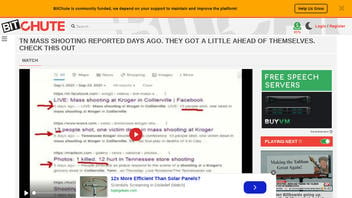
Are Google search result timestamps guaranteed to be the exact publication dates of web pages? No, that's not true: Google can only approximate the date that a web page was published.
The claim appeared in a video (archived here) posted to Bitchute on September 24, 2021. The video was titled:
TN MASS SHOOTING REPORTED DAYS AGO. THEY GOT A LITTLE AHEAD OF THEMSELVES. CHECK THIS OUT
It included a screen recording of search results of the phrase "Mass Shooting at Collierville, Tennessee Kroger" that narrowed the results from September 1 to September 22, 2021. Although the shooting occurred on September 23, 2021, some web pages about the event still popped up in the results.
This is how the video looked on September 24, 2021:
TN Mass shooting reported days ago. They got a little ahead of themselves. Check this out
Days before it actually happened or they put on the show. 13 Shot? Really? Did the shooter fire 33 shots? Was he born on Friday the 13th? Had he lived in the area for the past 11 years? Did he bring 7 guns with him? Did he have 6 kids with 3 differe...
Google can only estimate the date that a web page was created. According to a Google Search Central blog post (archived here) that discusses the dating mechanism:
Google shows the date of a page when its automated systems determine that it would be relevant to do so, such as for pages that can be time-sensitive, including news content:
Google determines a date using a variety of factors, including but not limited to: any prominent date listed on the page itself or dates provided by the publisher through structured markup.
Google doesn't depend on one single factor because all of them can be prone to issues. Publishers may not always provide a clear visible date. Sometimes, structured data may be lacking or may not be adjusted to the correct time zone. That's why our systems look at several factors to come up with what we consider to be our best estimate of when a page was published or significantly updated.
The post also suggested best practices to assist Google in identifying the correct web page publishing date, including:
- Troubleshoot by minimizing other dates on the page: If you've followed the best practices above and find incorrect dates are being selected, consider if you can remove or minimize other dates that may appear on the page, such as those that might be next to related stories.
Many of the search results in the screen recording on Bitchute were from news web pages, which often contain several dates pertaining to various news stories and are continually updated.
Similarly, in a Google SEO office hours session from August 6, 2021, a participant asked how Google determines when a page is updated. At the 18:32 mark, John Mueller, senior webmaster trends analyst at Google, answered:
We use multiple factors to try to figure out which dates are relevant for a page. So it's not just the metadata on the page, but we try to figure out like, has there actually been a significant change on the page.
After mentioning a help center article on the topic, Mueller went on at the 18:55 mark:
One thing that you should also keep in mind is that it should also be something visible on the page. So if you just change the date on a page, then that's something where we need to really recognize that you've made significant changes there so that we can show that to users and say 'Well actually something significant happened on this page two days ago or one day ago' or whatever. And kind of all of that needs to come together. And it's very possible that for some pages that we don't pick that up.
So that's something where I would not say that it's a given that even if you do everything right, we will use the date that you give us. Sometimes there are situations where our algorithms just pick something else, regardless.
Therefore, search results like those screen recorded in the video are not definitive proof that the content was published at the time that Google displayed.

















